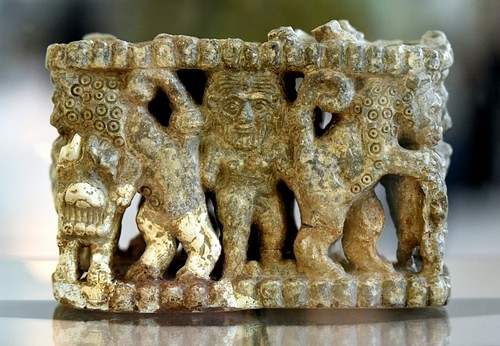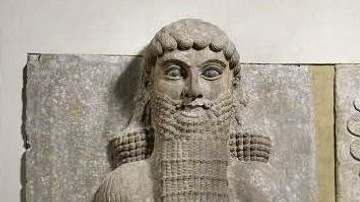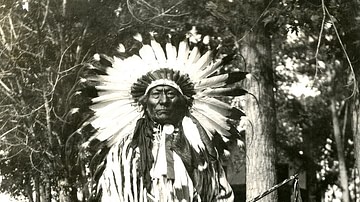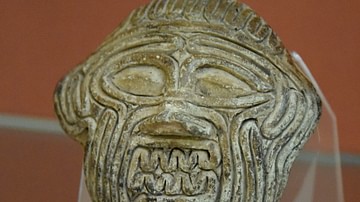Gilgamesh and the Bull of Heaven is a Sumerian poem relating the event, now famous from The Epic of Gilgamesh, in which the goddess Inanna/Ishtar sends the celestial bull to attack Gilgamesh after he has rejected her advances. The epic changes several details from the original poem which ends with praise for Inanna instead of Enkidu's condemnation.
The poem was originally known as sul-me-kam, translated as "Hero in Battle", but is best known today by its present title. It was written at some point prior to the Ur III Period (2047-1750 BCE) from an earlier oral tradition. The extant copies of the work come primarily from the ruins of the ancient city of Nippur and Me-Turan (modern-day Tell Haddad), Iraq, discovered in the early 20th century, and supplemented by other fragments found elsewhere.
The piece is not as well preserved as the other Sumerian poems that would eventually be drawn from in composing The Epic of Gilgamesh (c. 2150-1400 BCE), and modern translations rely on multiple copies to fill in missing lines from the various tablets and fragments. The opening line, "I will sing the song of the man of battle" is echoed in the famous first line of Virgil's Aeneid (c. 30 to c. 19 BCE), "I Sing of Arms and of a Man," but whether there is any direct connection between the two works is unknown and seems unlikely.
The poem was only translated in the mid-20th century but has since been recognized as one of the five early Sumerian works whose tales were reworked as The Epic of Gilgamesh:
- Gilgamesh, Enkidu, and the Netherworld (also known as Gilgamesh and the halub tree)
- Gilgamesh and Huwawa
- Gilgamesh and the Bull of Heaven
- The Death of Gilgamesh
- The Flood Story (Eridu Genesis and the Atrahasis)
As with the other tales featuring Gilgamesh, this poem is thought to have been based on the historical 5th king of Uruk whose reign was so impressive it gave rise to legends concerning his superhuman strength. The Bull of Heaven is frequently associated with the god Gugalanna, consort of Ereshkigal, Queen of the Underworld, and his death is thought to inform the action of The Descent of Inanna (c. 1900-1600 BCE) in which Inanna, after having caused the death of Gugalanna by sending him against Gilgamesh, is struck down by her sister Ereshkigal.
Summary
The poem begins with the narrator praising Gilgamesh as a "man of battle" in Segment A which then breaks off. Segment B starts with Inanna refusing Gilgamesh entrance to her temple (the E-ana) and Gilgamesh responding by telling her he has no desire to take her place but she also has no right to interfere in his business. The reference to a canopy in lines B3-B6 is unclear but has been interpreted by some scholars (including A. R. George and Samuel Noah Kramer) to suggest a wedding and that Inanna has proposed to Gilgamesh who has declined, rejecting her and inspiring her desire for revenge.
If this interpretation is correct, then this piece is relating directly the same story later told in The Epic of Gilgamesh when Ishtar propositions Gilgamesh and he rejects her. In some poems, like Gilgamesh, Enkidu, and the Netherworld, Gilgamesh is given as Inanna's brother and here he also appears as a demigod, son of the goddess Ninsun, who, even so, seems to be forgetting his place in treating Inanna disrespectfully by telling her he will do as he pleases. His reference to Ninegal, goddess of palaces, seems to suggest she will side with him, the king, against Inanna (lines B13-B18).
Inanna responds by asking the god An (Anu) for the Bull of Heaven to punish Gilgamesh, but he refuses (lines B31-B49), and Inanna then tells him that, if he will not let her have her way, she will scream – and it will be such a scream as resounds between heaven and earth. In some manuscripts, she only threatens to scream while, in others, she actually does so. Anu is frightened and gives her the bull (lines B50-B-54). This passage differs from the same scene in The Epic of Gilgamesh where Ishtar threatens to break down the walls of the underworld and release the dead to devour the living.
Lines 55 to the conclusion relate the destruction caused by the bull and the battle between the great beast and Gilgamesh, who is assisted by his friend (in some manuscripts, servant) Enkidu. Gilgamesh's reaction at first is to ignore the creature – even though it is drinking up rivers and destroying pastures and trees – as he drinks (presumably, beer) and tells his court musician Lugal-gabajal to tune up the strings of his lyre and keep playing (lines B64-B67). In the Me-Turan manuscript, he then confers with his mother, the goddess Ninsun, though her reply is lost.
She seems to encourage him to act, however, as he and Enkidu then attack the bull. Enkidu climbs up the bull's tail, distracting it, and Gilgamesh kills it with a blow to the head with his axe. He hurls the haunch of the bull at Inanna, who has been watching the battle from the city walls, and then he cuts the bull to pieces with his knife. In The Epic of Gilgamesh, it is Enkidu who hurls the leg of the dead bull at the goddess, and this affront, coupled with the role he played in the death of Humbaba in the Cedar Forest, condemns him to death.
At the end of this poem, however, neither hero is threatened with any kind of reprisal for killing the bull or insulting the goddess. The Nippur tablet breaks off, but the Me-Turan manuscript concludes with the praise of Inanna for the death of the bull. As noted, the piece is far more fragmentary than others, and it is understood there may be lines missing.
In lines D49-D52 of the Me-Turan manuscript, Gilgamesh tells the dead bull that, what he did to it, he will also do to Inanna, and yet no manuscript mentions any punishment for this challenge to the goddess or for the death of the bull. This omission may have inspired the Babylonian scribe, Shin-Leqi-Unninni (wrote 1300-1000 BCE), author of the standard version of The Epic of Gilgamesh, to have Enkidu punished for this affront as the lack of any divine response seems to leave the narrative incomplete.
Text
The following excerpt is taken from The Electronic Corpus of Sumerian Literature translated by scholar Jeremy Black et al. Ellipses indicate missing words or lines, while question marks suggest alternate translations for a word. Segments A and B come from "a version of unknown provenance, supplemented from the Nippur manuscript," and the piece is here concluded using the last lines of the Me-Turan manuscript. Names such as Gilgamesh, Inanna, and Uruk are given here in their standard spelling.
Segment A
A1-A4: I will sing the song of the man of battle, the man of battle. I will sing the song of lord Gilgamesh, the man of battle, I will sing the song of him with the well-proportioned limbs, the man of battle. I will sing the song of the mighty ... lord, the man of battle.
A5-A11: I will sing the song of the lord with the very black beard, the man of battle. I will sing the song of ... athletic strength, the man of battle. ...... the king, the man ...; my king ..., my lord ... garden ... ... courtyard, ... jipar; (1 ms. has instead: ... his mother who bore him spoke to the lord: "My king ...... in the river, my lord ... your garden." 2 lines unclear – unknown number of lines missing)
Segment B
2 lines unclear
B3-B6: In the great courtyard, without there being any combat, a man ... She perceived the canopy, the canopy ..., holy Inana perceived the canopy, from the palace of the abzu, she perceived the canopy ...:
B7-B12: "My wild bull, my ... man, I shall not let you go! Lord Gilgamesh, my wild bull, my ... man, I shall not let you go! I shall not let you go to dispense justice in the E-ana! I shall not let you go to pronounce verdicts in my holy jipar! I shall not let you go to dispense justice in the E-ana beloved by An! Gilgamesh, may you be ..., may you be ...!"
B13-B18: (Gilgamesh speaks:) "I shall certainly not try to take over the portion of Inanna in your jipar. Ninegal will not ... because of my valorous strength. But Inana, lady, don't you block my way, either! My wish is to catch (?) mountain bulls, to fill the cow-pens. I wish to catch (?) mountain sheep, to fill the sheepfolds. I wish to ... silver and cornelian."
B19-B30: The queen spoke with a snort; Inanna spoke with a snort: "... say to you. ... say to you. ..., Gilgamesh."
7 lines damagedB31-B36: (An speaks:) "Its entrails (?)... Its hide ... Its blood ..."
1 line damaged
"Inanna, it will muddy the waters; it will ... cowpats. My one beloved by An, ..."B37-B41: He let her hold the leash. An ... "My child, who does it belong to?" (1 ms. has instead: "My child, what use would it be?") "It will stir up the waters, it will leave ... cowpats ...! If the great bull is let loose, ... Uruk! If the great bull is let loose against Gilgamesh, ... Uruk! I will not give her that which bears my own name."
B42-B45: (Inanna speaks:) "Maybe it will muddy the waters and will leave gigantic cowpats – but let my father give me the Bull of Heaven, so I can kill the lord, so I can kill the lord, so I can kill the lord, lord Gilgamesh!"
B46-B49: Great An replied to holy Inanna: "My child, the Bull of Heaven would not have any pasture, as its pasture is on the horizon. Maiden Inanna, the Bull of Heaven can only graze where the sun rises. So I cannot give the Bull of Heaven to you!"
B50-B51: Holy Inanna replied to him: "I shall shout, and make my voice reach heaven and earth!"
B52-B54: He was frightened, he was frightened. (1 ms. adds here: ... was frightened of Inanna.) Great An replied to holy Inanna: "I shall give her the Bull of Heaven." (instead of approx. lines 52-54, 1 ms. has: She made her voice reach heaven ..., she made her voice reach earth; she made her voice reach heaven ..., she made her voice reach earth. It covered them like a woolen garment, it was spread over them like a linen garment. ... who could speak to her? ... who could speak to her? ... gave ...)
B55-B63: In masculine fashion, the maiden Inanna grasped it by the lapis-lazuli tether. Holy Inanna brought the Bull of Heaven out (1 ms. has instead: down). At Uruk, the Bull devoured the pasture, and drank the water of the river in great slurps. With each slurp it used up one mile of the river, but its thirst was not satisfied. It devoured the pasture and stripped the land bare. It broke up the palm trees of Uruk, as it bent them to fit them into its mouth. When it was standing, the Bull submerged Uruk. The very presence (1 ms. has instead: the name) of the Bull of Heaven submerged Kulaba.
B64-B67: His musician ... As he looked up ..., leaning (?) ...
1 line unclear
(1 ms. has instead: Then lord Gilgamesh ... his musician.)(a second ms. has instead: Gilgamesh ... his musician Lugal-gabajal. "My musician, tune your strings, ... give me a drink, ... ... bronze ... in your hand ... His musician ...")
(a third ms. has instead: ... replied to Lugal-gabajal, "Lugal-gabajal, tune your strings; I wish to have a drink!" (Lugal-gabajal answers:) "... drink, that is why nothing of yours is important." ... replied to Lugal-gabajal.)
(instead of approx. lines 64-67, a fourth ms. has:
3 lines unclear
... drink, lord ... ... drink, lord ...
7 lines missing or unclear
... Uruk ...)B68-B83: Lord Gilgamesh ... Inanna ... the Bull of Heaven. At Uruk, the Bull ..., and drank the water of the river in great slurps. With each slurp it used up one mile of the river, but its thirst was not satisfied. It devoured the pasture and stripped the land bare. (1 ms. adds here: His lady ... Gilgamesh ... said, "My mother ..., my sister ..., will ... the cattle to their tethering stakes, will ... the sheep to their tethering stakes, will ... to their tethering stakes." Gilgamesh ..., "Bull of Heaven, you, yes you, ...; you, yes you – you do not ..." Gilgamesh ...)
5 lines unclear
"They will throw your corpse in the deserted streets and throw your intestines in the broad square. They will send your carcass to the knacker's, and I shall share out your meat in baskets to the widows' sons who are citizens of my city ... I shall make flasks of your two horns for pouring fine oil to Inanna in E-ana."B84-B90: Inanna watched from the top of the ramparts. The Bull bellowed in the dust, and Gilgamesh walked (?) at its head as Enkidu climbed up the rope of its ... Their fellow-citizens came along ... It covered them with dust, like a young calf unused to the yoke. Enkidu stood behind the Bull and went round ... (1 ms. has instead: He put ... and seized its tail.) He spoke to his master Gilgamesh:
B91-B103: "Ho! magnificent one, extending your staff of office, born of noble lineage, splendour of the gods, furious bull standing ready for battle, who is respected as the great lord Gilgamesh of Uruk! Your mother was truly skilled in bearing children, and your nurse was truly skilled in suckling her charges! (1 ms. adds: Lord born of noble lineage, ...) Do not fear – the warrior without strength ... himself (?). There where the road is straight ... ... axe ... "
4 lines unclearunknown number of lines missing
Me-Turan Manuscript: Segment D, Last Section:
D33-D38: The Bull ... in the dust. Gilgamesh ... and Enkidu ... Their fellow-citizens ... ... with dust, like a young calf unused to the yoke. Enkidu stood by (?) the Bull's head and spoke to Gilgamesh:
D39-D44: "Ho! magnificent one, extending your staff of office, born of noble lineage, splendour of the gods, furious-hearted bull, standing ready for battle, warrior, ... your hand ... The people ..., the people ..."
D45-D48: When Enkidu had spoken thus to Gilgamesh, Gilgamesh himself smote its skull with his axe weighing seven talents. The Bull reared up so high, so high that it overbalanced. It spattered like rain, it spread itself out like the harvested crop.
D49-D52: The king took his knife in his hand, just as if he were a master chef. He hit Inanna with a haunch, he made her flee away like a pigeon, and demolished those ramparts. Standing by (?) the Bull's head, the king wept bitter tears: "Just as I can destroy you, so shall I do the same to her (?)."
D53-D59: As he spoke, he consigned its hide to the streets, he consigned its intestines to the broad square, and the widows' sons of his city each took their share of its meat in baskets. He consigned its carcass to the knacker's and turned its two horns into flasks for pouring fine oil to Inanna in E-ana.
For the death of the Bull of Heaven: holy Inanna, it is sweet to praise you!







